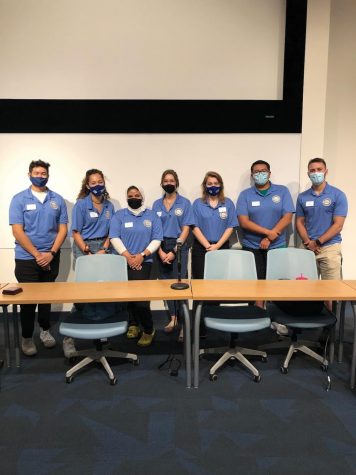Make Money or Spend Money: What Would You Choose?
The decision to go to college or not comes at a trivial point in a young person’s life, and that lone decision could have a huge impact on one’s future. So is college enough anymore? Or has it become the “new” high school?
“A college education produces many outcomes for students, including discovering the field they wish to establish a career in, develop critical thinking skills and group interaction skills that employers are looking for, and also serves as a launching pad for students who wish to pursue specialized education in forms of masters and/or terminal degrees in various disciplines,” said Frederic Baker, associate dean of students.
“I think that it is very career dependent. There are jobs out there that you can get by with a high school education but they are far and few between,” said UNH junior Dan Brophy. “For some careers like psychology you will absolutely need something higher than a bachelor’s in order to get a good job. My major is accounting and we can get by with a bachelor’s but we need a master’s in order to get certification which is preferred in the field and could help me earn more money and get higher up in the firm.”
“The whole point of getting an education is to acquire a specialized set of skills that employers need. It is possible for some to learn these skills without going to school, or with just a high school diploma. Programmers are teaching themselves how to program through high school and getting high-salary jobs immediately out of high school because employers can easily tell if they have the skills required, and will hire them accordingly,” said sophomore Ryan Cummings.
Brophy added, “I also think there is a disconnection where the education doesn’t seem to be enough for employers who are looking for experience of 3+ years for entry level positions, and it makes it hard to justify the education and how much it’s really worth to employers.”
Cummings added another perspective to consider. “The issue is that your credibility comes into question. If an applicant has a bachelor’s degree but tested worse than one with self-taught knowledge, then the latter seems to be the obvious choice. However, the employer might see that bachelor’s degree and think that it shows dedication, rigor, loyalty or what have you, whereas the latter has no credibility. Not having a bachelors degree doesn’t mean you’re forced to work fast food, it just means you need to find a niche market, and get the skills to fill the demand. Somebody made over 100k last year spray painting biodegradable paint on lawns for Realtors. Did he need a degree for that?”
“I think that the jobs with high school diplomas only will pay less because they aren’t as specialized, unless of course they are technical jobs like HVAC or plumbing” Brophy responded. “It might have people living below the poverty threshold depending on the job, because when I think of jobs that only need a high school diploma I think of food service, which is usually minimum wage.” It is important to know whom to call when your plumbing system needs fixing.
According to the Huffington Post via the Wall Street Journal, “about 284,000 Americans with college degrees were working minimum wage jobs last year.” That is 70 percent more college grads working for the minimum wage than 10 years ago. Still, the number is down from its 2010 high of 327,000.
“While not mandatory, studies show that college graduates out earn non-college graduates over the course of their lifetime at a significant rate. That being said, many vocations which do not require a bachelors degree can be very fulfilling while commanding a good salary,” said Baker.
“College is not for everyone. Those who wish to build houses, fix cars, install plumbing, many other professions do not require four years of expensive education let alone any additional years of college. College should be looked at as an investment involving your future earning power. If you want a job that will pay 50K a year, it makes little sense to go 160K in debt to get four years of ‘higher level’ education,” said Krystal Ross, who works as an actuary at Starr Companies. “However, going beyond a bachelor’s degree in my profession is rare and sometimes frowned upon. This is because we continue our education through more specialized exams that are taken while on the job.”
Sometimes unexpected circumstances present opportunities of a lifetime where education then comes second. You can always go back to school, but you can’t always get the same job opportunity. “I am a big believer in going to college, but I’m a bigger believer in doing what’s best for you,” said Ross.
“I’m not necessarily sure everyone should go to college,” said Jerry Allen, Ph.D and professor in the College of Arts & Sciences. “If you choose to, I believe it should be to either benefit your chosen career or to complete personal goals.”
Allen further explained that training might be a better option for some people, that some professions, such as a plumber, make a lot of money without a college degree. He said that a study also showed that more parents felt that students should go to college instead of the students themselves. “A graduate student of mine said seven little words have controlled my life, ‘You are going to be a doctor,’ and after taking my classes and talking to me one day, he admitted he didn’t want to be a doctor, but his family had been telling him that’s what he was going to do with his life,” Allen said.
Baker recommends to students that they get some experience in their chosen profession before beginning an advanced degree. “Very often the workplace is a very different environment than the classroom, and it’s important to confirm that you enjoy your work before obtaining a terminal degree in that discipline,” he said.
Whether or not you further your degree does depend on your area of study. “Professions such as business management, doctors, or teachers should go to graduate school,” said Allen, but more schooling “doesn’t benefit everyone.” College can give individuals more experience and an outlet to broaden their horizons. It is important to lead a satisfactory life, and college can help you decide exactly you want to do and answer your curiosity.
“Everyone has time, and at such a young age when deciding on college, you have even more time,” said Allen. He explained if you want the opportunity, everyone should have the opportunity for personal growth, but you shouldn’t force getting your degree if it’s not needed; sometimes there is too much force.
It’s not about the grades you make; it’s about the hands you shake. “Experience puts you in the situation, and not only increases your skill level the more you do it, it broadens your perceptual depth, increase the way you view the world, broadens your reflection, and develops your people skills,” said Allen.
So when deciding what your next step will be, whether as a high school senior or a college senior about to apply for graduate school, there is a lot to consider. Would you rather spend the money to make more money? Or start making money right off the bat?











